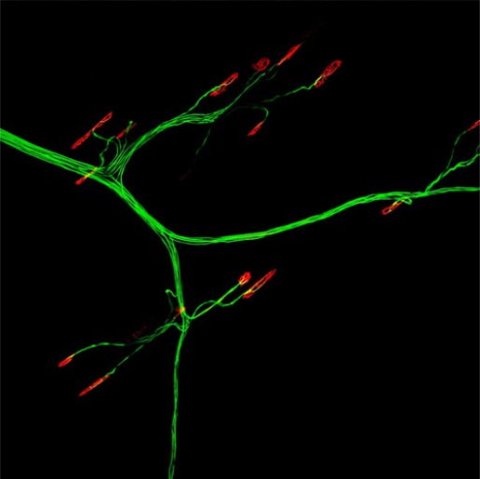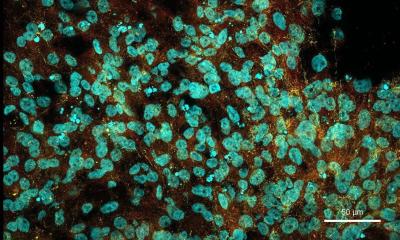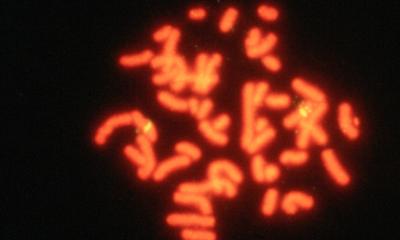News • Research on syndrome correlation
Finding the link between Guillain-Barré and Takotsubo
Guillain-Barré syndrome (GBS), a rare immune-mediated peripheral neuropathy that can cause permanent disability and even death and be quite severe to manage.

Image credit: "Mouse neuromuscular junctions" by James N. Sleigh
In this acute disorder, which typically triggers after a respiratory or gastrointestinal tract infection, the body’s immune system attacks its own peripheral nerves, damaging the myelin sheath or axon that constitute peripheral nerves. If left unchecked, GBS can lead to weakness, numbness, and ultimately paralysis. In most cases, GBS also causes transient autonomic dysfunctions, including heart, bladder, and bowel problems. Interestingly, GBS can also cause a condition known as Takotsubo cardiomyopathy (TCM). Commonly known as the ‘broken heart syndrome,’ TCM is characterized by a ballooning of the left heart ventricle and weakening of heart muscles, leading to symptoms like those observed during a heart attack. Despite doctors recognizing TCM as a complication of GBS, not much is known about the association between the two.
In a recent study published in the Journal of Neurology, a research team from Japan sought to tackle this knowledge gap. Researchers from the Faculty of Medicine at Kindai University, including Dr. Atsushi Terayama, Dr. Motoi Kuwahara, Dr. Keisuke Yoshikawa, Dr. Susumu Kusunoki, and Professor Yoshitaka Nagai, conducted a retrospective comparative analysis of clinical data on patients with GBS and GBS-TCM. “As TCM is a serious complication of GBS, physicians should pay more attention to it. However, to our knowledge, only a few studies to date have focused on the relationship between these disorders,” comments Terayama.
Recommended article

News • "Broken heart syndrome"
Brain changes linked to emotion discovered in Takotsubo syndrome
Changes in areas of the brain associated with emotion have been identified in people with Takotsubo syndrome, sometimes known as broken heart syndrome, according to new research.
First, the researchers gathered clinical and serological information of eight patients with GBS-TCM whose sera had been analyzed between 2013 and 2020. They then compared this data with that of 62 patients with classical GBS, without TCM, gathered in 2020. Assessed parameters included white blood cell count and protein levels in cerebrospinal fluid, standardized muscle weakness scores, disability scores, and respiratory failure, to name a few.
Our findings suggest that the involvement of the glossopharyngeal or vagus nerves causes a reduction of inhibition to the vasomotor center, resulting in hyperactivity of the sympathetic system
Atsushi Terayama
Through statistical analyses, the team identified several key factors that stood out in the GBS-TCM group, compared to the control GBS group. The age at GBS onset among GBS-TCM patients was significantly higher than in the control group, implying that the elderly are more prone to developing TCM as a complication of GBS. Additionally, GBS disability scores and muscle weakness scores were markedly worse for GBS-TCM at nadir, that is, at their lowest point or most acute moment over the course of the disease. Both limb weakness and respiratory failure were more prevalent and severe among GBS-TCM patients than patients with only GBS.
One of the key clinical factors that the researchers investigated was the involvement of cranial nerves. They found that all patients in the GBS-TCM group suffered from lower cranial nerve deficits, compared to less than half in the GBS-only group. More specifically, all GBS-TCM patients showed glossopharyngeal nerve or vagus nerve involvement. In addition, even though only two GBS-TCM patients were tested, the catecholamine levels in plasma or urine were elevated.
These data add crucial pieces to the puzzle for understanding why TCM occurs as a complication of GBS. As Dr. Terayama explains, “Our findings suggest that the involvement of the glossopharyngeal or vagus nerves causes a reduction of inhibition to the vasomotor center, resulting in hyperactivity of the sympathetic system. In turn, this promotes the release of catecholamines from the adrenal medulla, which may possibly lead to the development of TCM.”
Taken together, the results of this study could pave the way for better management of GBS and GBS-TCM. “Our findings will hopefully lead to the early detection of TCM development after the onset of GBS and contribute to better management and improvement of the prognosis for TCM,” concludes Terayama.
Source: Kindai University
14.04.2024











